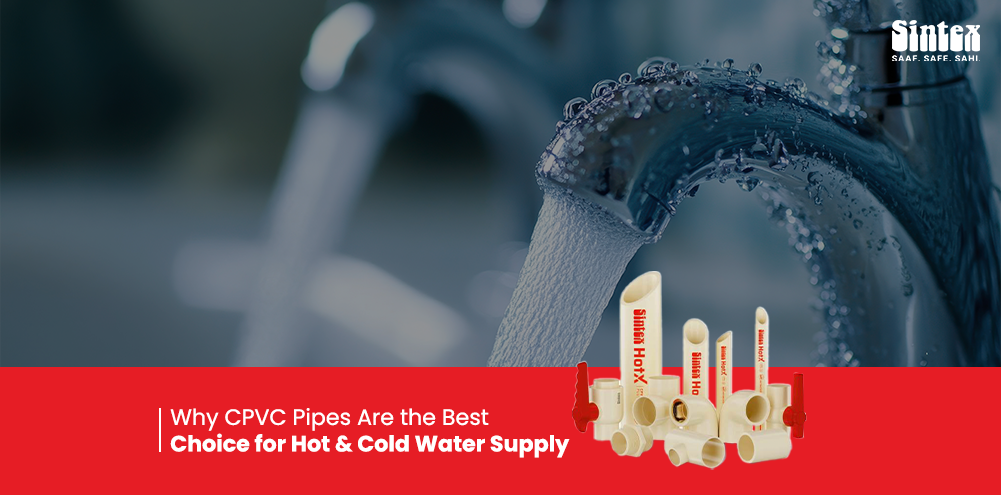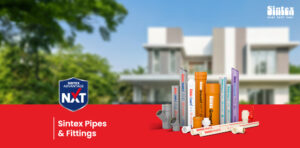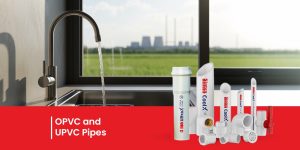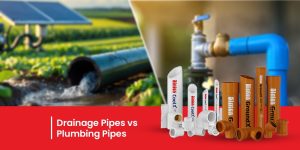Why CPVC Pipes Are the Best Choice for Hot & Cold Water Supply
Share

Table of Contents
It isn’t easy to decide on the right piping system for your building or home. Plastic, metal, or is there something else? The reality is that not all pipes are designed to cater to hot and cold water demands. That’s where CPVC pipes stand out. Unlike ordinary options that weaken under pressure or crack with heat, a CPVC hot water pipe is designed to deliver safety and durability in every drop that flows through it.
We’ve seen how often people struggle with plumbing failures because of the wrong material choice. That’s why understanding the difference between CPVC and UPVC pipes is more important than ever. In this guide, we’ll explore why CPVC pipes and fittings are trusted in homes, hotels, hospitals, and industries worldwide, and why Sintex has earned a reputation for long-term reliability as the best CPVC pipes.
Why Choosing the Right Pipe Matters?
When building a safe home or running a reliable commercial water system, piping makes all the difference. A weak or poor-quality pipe can rust, leak, or burst upon applying pressure and high temperature.
Most homeowners and experts nowadays are shifting towards CPVC pipes and fittings. They are long-lasting, consistent, and made in a way to accommodate cold and hot supplies of water without anything being compromised.
What Are CPVC Pipes?
A CPVC pipe is a Chlorinated Polyvinyl Chloride pipe, which can withstand more heat than regular plastic pipes. Unlike plain plastic options, a hot water pipe (CPVC) can safely handle up to 93 degrees Celsius. That makes it suitable for bathrooms, kitchens, and industrial uses with continuous hot water flow.
These pipes are safety-certified to transport drinking water free from harmful chemicals that may enter your supply. When you install them, you’re creating a system for water and an overall long-term safety system for your workplace or family.
What are the Benefits of Using CPVC Pipes for Hot and Cold Water?
1) Thermal Resistance
The most outstanding feature of a CPVC hot water pipe is that it is extremely heat-resistant. This is far better than plastic pipes, which melt or deteriorate with hot water.
2) Corrosion-Free
It’s unlike metal pipes, which don’t rust or get corroded even after decades of exposure to water. You don’t need to worry about colouration or foul taste in your water.
3) Long Life Span
Due to their resistance to chemicals, chlorine, and physical abuse, these pipes exhibit long-life performance without repeat replacements.
4) Easy Installation
CPVC pipes & fittings utilise solvent cement in jointing, thus making installation quick, cost-effective, and safe.
Sintex HotX CPVC Plus comes with a unique NXT Anti-Microbial advantage that keeps your homes strong & safe under extremely high pressure & temperature (up to 93 degrees Celsius) conditions.
CPVC vs UPVC Pipes: Key Differences
One of the most common questions buyers have is the difference between CPVC and UPVC pipes. Here’s a clear comparison to help:
| Feature | CPVC Pipes | UPVC Pipes |
| Temperature Tolerance | Up to 93°C | Up to 60°C |
| Best Use | Hot and Cold Water Supply | Cold Water Supply |
| Flexibility | More flexible, less brittle | Rigid and less flexible |
| Cost | Slightly higher CPVC pipe price due to durability | Lower price, but limited use |
| Safety | Certified safe for potable water | Safe for cold water only |
If you are comparing UPVC pipes vs CPVC pipes, the decision is simple. CPVC is the only safe and reliable option for any hot water application.
Real-Life Uses of Sintex HotX CPVC Plus
- Residential Buildings: Bathrooms, kitchen, and overhead tanks where hot water and cold water are utilised daily.
- Hotels and Hospitals: Places requiring continuous hot water supply for showering, kitchens, or cleaning systems.
- Industrial Applications: CPVC piping and fittings are preferred by factories requiring high-temperature fluid transfer because they are reliable.
CPVC Pipes & Fittings That Make a Difference
Pipes alone are not enough. You also need strong joints and connectors to create a leak-free system. Quality CPVC connectors and brass fittings are designed to hold high torque and pressure, ensuring your system never fails under stress. This is especially important in multi-storey buildings where water pressure is naturally higher.
CPVC Pipe Price: Is It Worth It
Others are not purchasing because the CPVC pipe is slightly more expensive than UPVC or PVC. But consider this: do you want to save a few today and spend on replacement and maintenance afterwards, or spend once on the finest CPVC pipes that will last you decades?
In real life, CPVC proves cost-saving over time by ensuring low maintenance, no water damage, and consistent performance.
Why Sintex Offers the Best CPVC Pipes in the Market
When you choose CPVC products from trusted brands like Sintex, you’re not just buying a pipe; you’re buying peace of mind. We offer CPVC pipes and fittings with built-in antimicrobial properties, UV resistance, chlorine resistance, and IS-certified durability. That means every pipe is designed with your health and safety in mind.
Their premium brass fittings contain bigger knurling grooves that give you a better grip and more torque. So whenever you hear the term best CPVC pipes, it is not hype; it is supported by performance and safety standards.
Final Thoughts
Selecting CPVC vs UPVC pipes is determined by the purpose for which you want to use them. If you require a system compatible with hot and cold water, solely CPVC hot water pipe systems have the longevity, safety, and performance you are entitled to. With accurate CPVC pipes & fittings, you are not developing plumbing lines; you are developing trust, safety, and long-term worth.
If planning your next home or commercial project, consider the best CPVC pipes and CPVC connectors from renowned manufacturers like Sintex. It’s not simply a pipe; it’s the start of a safe water system.
If planning your next home or commercial project, explore the best CPVC pipes and CPVC connectors from trusted brands like Sintex. It’s more than just a pipe; it’s the backbone of a safe water system.
FAQs
The main difference is heat resistance. CPVC pipes can carry cold and hot water, while UPVC is only for a cold water supply.
Yes. A CPVC pipe is approved for safety and does not poison drinking water with poisonous chemicals.
Absolutely. Though it may be a little expensive than UPVC, its longevity, safety, and compatibility with hot water are well worth the extra money in the long run.





